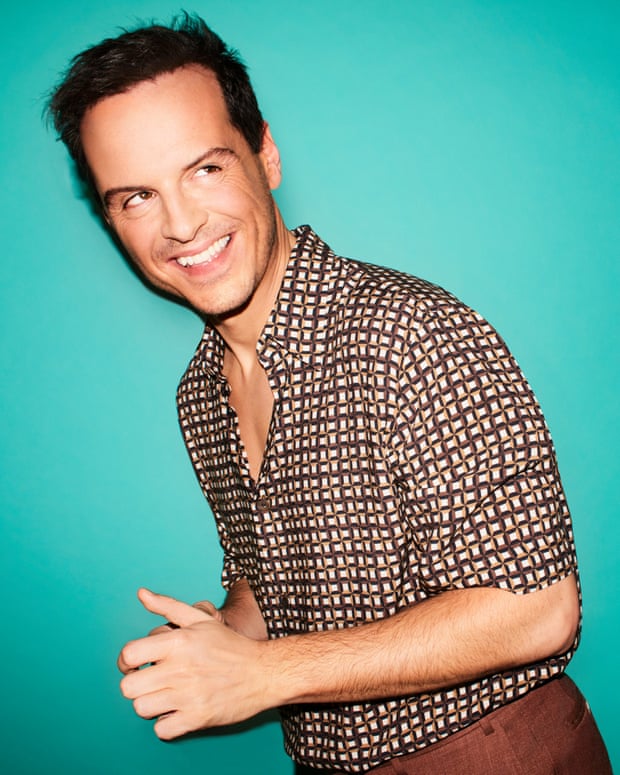
Keen to avoid being typecast as baddies like Moriarty, the actor is delighted to be playing a sexy priest in the eagerly awaited second series of Phoebe Waller-Bridge’s Fleabag
Andrew Scott is keen to get rid of me. He is about to have his picture taken and has come over paralysingly self-conscious. The stylist walks over and whispers in my ear. “Andrew says you don’t have to be here,” she says. That’s fine, I reply, I’ll just get on with my own stuff. “No,” she says, “he doesn’t want you here.” Oh.
I withdraw into a freezing studio next door, a little hurt, and use the time to watch the end of one of Scott’s forthcoming films, Steel Country, in which the actor plays an obsessive, possibly autistic sanitation truck driver determined to investigate the death of a child. About 40 minutes later, Scott emerges. Now he is not only paralysingly self-conscious, he’s desperately apologetic. “Sorry, I hope they didn’t… I said, ‘Simon doesn’t have to be here,’ and then they… anyway, sorry.”
It’s a classic Scott sentence. Put somebody else’s words into his mouth (Shakespeare, say) and his delivery is magical: that singsong Dublin accent changing pitch by the word, that wonderful ability to make the prosaic poetic and vice versa. But put his own words into his mouth and he splutters and stalls like an old banger cranking up in a deep chill. Sentences drift off into the ether, and often have no middle; sometimes it’s hard to work out where or why they began.
Scott asks me what I’m watching. Steel Country, I say. He shrieks in shock. “Oh Jesus! Really? How did you get it?” He’s so discombobulated that he runs off to the toilet, possibly for good.
When he returns, he fiddles with the heating before settling down. “I can’t believe you’re watching that film. That’s extraordinary. I don’t even know when it’s coming out.” I just asked for a preview copy, I say. “Oh, that’s nice of you, thank you.” He is scrupulously polite.
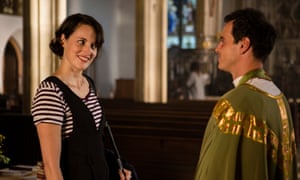
Though he doesn’t like to dwell on it, Scott is probably still best known for his role as Moriarty in the TV series Sherlock. Until he arrived, the show was all about the eponymous hero, played by Benedict Cumberbatch; Scott, working his sweet, boyish face into a kind of crazed malevolence, provided Sherlock with the five-star foe he deserved – an evil genius who promises his arch enemy, “I will burn the heart out of you.” In their final face-off, the two men stare into each other’s eyes and acknowledge they are identikit sociopaths – even if the detective is ostensibly on the side of the angels.
Now Scott is back on television in a role likely to define him in a very different way. He plays a priest in the second series of Phoebe Waller-Bridge’s Fleabag, the comedy-drama about a young woman trying to navigate sex, family dysfunction, loss and life. Series one, for which Waller-Bridge won a Bafta, ended with Fleabag broke and broken, and the revelation that she was responsible for her best friend’s death. Series two, which also features Kristin Scott Thomas and Fiona Shaw, begins 371 days, 19 hours and 26 minutes later. Fleabag’s browbeaten father (Bill Paterson) and her monstrous stepmother (Olivia Colman) are taking the family out to dinner to announce their marriage. And of course, it goes disastrously.
Scott’s Catholic priest is introduced as the man who will conduct the wedding ceremony. But as you may expect from a Waller-Bridge creation, this is no regular clergyman. His parents are alcoholic lawyers, his brother a paedophile lorry driver, and he is sweary, subversive and seductive. The first new episode concludes with Fleabag and her sister Claire sharing the same thought. “The priest is quite hot,” Claire says. “So hot,” says Fleabag with a trademark conspiratorial glance at the camera. We are left with a sneaking suspicion that this particular man of God might be shagged senseless by at least one, if not both, sisters.
I like the idea of not being defined as one thing, whether that’s being an actor, or being Irish, or being gay
Scott and Waller-Bridge first worked together a decade ago when they were cast in the play Roaring Trade, about City shenanigans, at the Soho theatre in London. (On a publicity photo, Waller-Bridge’s power-suited Jess is seen strangling Scott’s unscrupulous Donny with his tie.) Of that time Scott says, “Nobody had a clue who we were.” He was surprised when Waller-Bridge offered him the part in Fleabag. “We’d not seen each other for so long. But we had a natural chemistry then, and we still do. What I love about Fleabag is that it talks about sex in what Americans would call a very sex-positive way. It’s the thing that every single person in the world is interested in, whether they are sexual people or not.”
I email Waller-Bridge to ask why she cast him, since Scott’s not sure. “It couldn’t have been anyone else,” she replies. “It wasn’t an easy ask – someone who could convince as a person who’s seemingly totally at peace, but at the same time has a promise of danger. He had to be a character that Fleabag couldn’t sum up and dismiss as easily as she has with so many others – so he had to be played by an actor who you can’t define. Andrew has the charisma of 10 people rolled into one.”
The other thing Scott loves about Fleabag is that his name will no longer be synonymous with Moriarty. Before our interview, Scott made two demands – I had to have seen his Hamlet, and he didn’t just want to talk about Moriarty. The funny thing is, though, you can see his Moriarty in his Hamlet – performed at the Almeida theatre in London in 2017, and screened on BBC2 last year – not least the way Scott segues from meek introvert to raging madman. I tell him I loved the way his Hamlet spoke: you could understand every word, even if you’d never read Shakespeare before. “That’s the point,” he says, suddenly blazing with enthusiasm. “I’m obsessed with this. It’s a thriller. It’s supposed to be for everybody. I hate the idea that Shakespeare’s just supposed to be for academics.” He earned rave reviews (the Observer’s Kate Kellaway called him “a brilliant communicator”) and was nominated for an Olivier award.
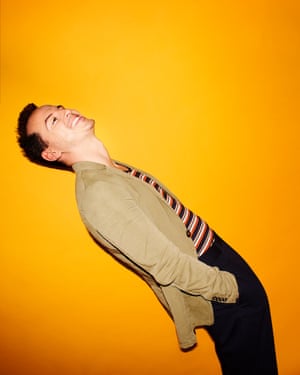
Scott does an impersonation of the way Shakespeare has been performed in the past – grandiose and hammy, with more than a hint of the Johnny Gielguds. “I love the idea that a 14-year-old will come and go, ‘God! That’s brilliant!’ Because we’re competing with box sets and you’ve got to be as good as box sets. Rob Icke, the director, said, ‘It’s not like eating your greens’ – Shakespeare shouldn’t be something you have to do, it should be properly stirring.”
It was the toughest and most rewarding part he has played. “There was some great actor, maybe Peter O’Toole, who said that after playing Hamlet he felt altered. And I think that’s true. You have to play all facets of yourself – the lover, the son, the prince, the student.” He believes that what makes Hamlet centuries ahead of its time is its exploration of mental illness. “We’re still at the tip of the iceberg, in terms of our understanding of mental health. We need to learn so much more.”
Has he had mental health problems of his own? “I don’t think there’s a person in the world who hasn’t. It’s like being asked if you have ever been physically ill, and saying, ‘Nope, never had anything wrong!’ Of course I have. For me, it’s like weather. Sometimes it’s fucking storming down on you.” And when it is, he says, the best thing you can do is face it full on. “This idea of west coast positivity pisses me off, the idea of putting a positive spin on it. I don’t think it’s healthy. There’s no point in being in the driving rain and going, ‘Shine, sun, shine!’” He makes a strange, distant noise from deep within himself – as if he is conjuring up a demon. “You can’t do it. You’ve just got to be in the weather. And that’s where I think our biggest problems come from.”
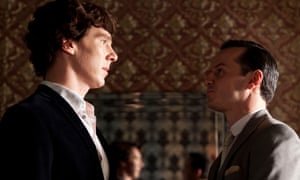
Until Hamlet, Scott thought he was in danger of being typecast. “I was a little bit tired of playing the freak. Do you know what I mean? What I really look for, and what attracts me in other people, is vulnerability. So being known for playing monstrous people, you know…” Another embryonic sentence is discarded.
Apart from Moriarty, who does he mean: Max Denbigh, the villainous head of national security he played in the 2015 Bond film Spectre? He nods and says it’s something he fell into, or that casting directors plunged him into. It’s funny that people see you as a baddie when you’ve got such a baby face, I say. “I don’t think, when I was 20, people said, ‘He’s going to make a great villain.’” Another pause. “Don’t get me wrong, I love those parts.”
He’s being tough on himself. In fact, one of the appealing things about Scott is that you never know quite what he’ll turn up in next. So he flips from the nebbish nerd in 2004’s TV comedy My Life In Film to the principled priest in Ken Loach’s Jimmy’s Hall; from the cerebral lawyer Anthony Julius, taking on Holocaust denier David Irving in Denial, to the lovably morose gay bookshop owner Gethin in Pride; back in 1995, he played a nameless corpse on the beach in Spielberg’s second world war epic Saving Private Ryan.
He has been equally prolific on stage, starring in three plays at the Royal Court in London. Scott won an Olivier in 2005 for his role in Rob Evans’ abduction drama A Girl In A Car With A Man; played twin brothers in Christopher Shinn’s Pulitzer-nominated Dying City, about the aftermath of 9/11; and was a self-obsessed rock star in Simon Stephens’ Birdland in 2014. He made his Broadway debut in 2006 alongside Julianne Moore and Bill Nighy, in David Hare’s The Vertical Hour about the 2003 invasion of Iraq.
Change, he says, is all-important. He can’t stand the idea of being pigeonholed. Many actors are embarrassed about spending their life playing parts, as if it were infantilising, but Scott isn’t. In fact, he is such a passionate advocate of play that his stubby, broken sentences become louder and louder as he makes the case for it. “I love the idea of playfulness. And you do play a part. It’s really fucking important in life. Just taking things a little more lightly.” I’ve never heard anybody talk with such intensity about the importance of lightening up.
It’s all of a piece with his acting. At times, Scott’s performances are so quiet you barely notice him. And then he turns on a sixpence: a change in register, a look in his eyes – which can glint with cruelty, sarcasm, turmoil.
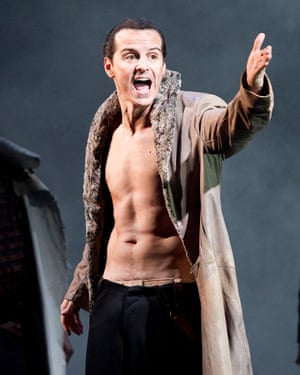
You know when your characters suddenly go off on one, I say, is that a trick you have learned or is it actually you? “I think I am pretty manic – ‘energised’, as the Americans might say.” He laughs. “I think it is part of me. In life, I am quite a playful person. I like a fluidity in relation to the work I do – even in my own personal life. I like the idea of not being defined as one particular thing, whether that’s being an actor, or being Irish, or being gay, whatever the fuck it is. I don’t think there’s too much value in saying, ‘This is what I am.’”
***
Now 42, Scott grew up in Dublin with two sisters; his older sister, Sarah, is a sports coach and television commentator, his younger sister, Hannah, is also an actor. His father, Jim, worked for an employment agency, while his mother, Nora, was an art teacher. He attended a private Jesuit school and went to drama classes on Saturday. A painfully shy schoolboy, he was liberated by acting. “I was just so self-conscious, but I felt free on stage. I could be more audacious.” He fidgets away like a hyperactive hamster as he talks, tearing a cardboard cake wrapper into pieces.
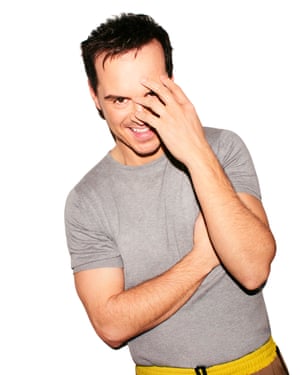
Scott was a promising painter and won a bursary to art school at the age of 17. But on the day he was due to start, he was cast in his first film, Korea, about an Irish boy emigrating to America in the 1950s and being enlisted to fight in the Korean war. He turned down art college, made the film, then went to Trinity College to study drama. When he got there, he thought it was a waste of time – all theory and no practice. After six months, he quit to join Dublin’s Abbey theatre.
Since leaving Ireland for London in his early 20s, Scott has spent most of his adult life in England. But recently, he bought himself a house in Dublin, a city he says he has come to realise is much more than a home. For a long time, he felt alienated from Ireland – associating it with the Catholic church, bigotry and archaic views on homosexuality and abortion. England, he thought, was a relatively progressive, liberal country, but not any more. Brexit is a factor, he says. “The greatest tragedy is that it’s so confusing for people to even understand what it is. It’s like a crazy golf course.”
I came over here to have some breathing space and find out who I could be
Ireland has a lot to be proud of these days, hasn’t it, I say. Scott’s face lights up. “I agree, I totally agree. It’s extraordinary, isn’t it? The development of Ireland. The emancipation of Ireland. I find it very moving. I can’t really speak about it without being emotional, because the Catholic church had such a stranglehold on Ireland. And that has certainly dissipated. For me it began with the marriage referendum in 2015. Then last year we had the abortion referendum.”
For once the words just pour out. “In 1993, when I was 16, it was illegal to be gay. It’s extraordinary.” Was that scary? “Yes, certainly. It would have been under the surface and I always felt loved. But I definitely came over here to have some breathing space and find out who I could be. When the marriage referendum happened, I bought a little house in Dublin. I had a real feeling of wanting to be involved in Ireland, and Irish culture, and the Irish people. And I must have felt I wasn’t fully embraced by that when I was younger.”
Was he angry with Ireland? He answers in the present tense. “I definitely feel angry about the attitude towards sex and sexuality. The Catholic church’s ideas about sexuality, and the terrible pain that they inflicted on children – the primness and deep conservative attitude towards sex as something that needs to be feared.” And of course, he says, it was made so much worse by the hypocrisy. “Practically every week when I was growing up in the 90s, I’d listen to my dad’s radio on the way into school and there were stories about abuse. Unbelievable abuse, extraordinary abuse, and priests having affairs with people, and the damage is limitless. And I certainly know, personally speaking, emancipating myself from that, dealing with my own shame and guilt, realising my own self-worth, that’s been a really big job for me. And I feel really proud that I’ve done that.”
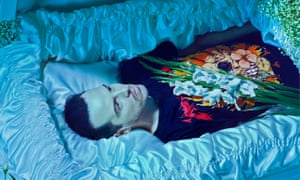
What did he feel shame and guilt about? “About who I was. Or that you can live a life less ordinary and still have the attributes of kindness and compassion and community. That there’s more than one way to live a life.”
Is he still Catholic? “No, I’m not,” he says. I give him a look. Are his parents Catholic? “Yes. I was brought up Catholic.” He laughs uneasily. So you are disowning your Catholicism? “Yes. A lot of my family are Catholic, and I totally respect that. I suppose what I mean is, there is a real need in our culture for security and predictability and living a life that’s going to keep us safe. And I also think there’s a human need for adventure and autonomy and transgression. I really found myself in being able to embrace those thoughts and still be a good person. In a world of innovation, I feel we lack innovation when it comes to sexuality and relationships.’”
When did he first say out loud that he was not Catholic? He bursts out laughing. “Five minutes ago. Normally I would say I was brought up Catholic, and actually why do I have to say that?” He’s still giggling about the idea that he has eliminated the church from his life with a simple “No”. Does he feel different for saying it out loud? “Fuck, yeah! Do I look different?”
I ask if his parents are liberal. “Yeah, it turns out they are.” What does he mean by that? “Well, I suppose I had a fear that they weren’t. We went to Catholic school and they’re both churchgoers. I think having gay people in the Scott family has been the making of our family – to be able to engage in that conversation openly.” He came out in his early 20s. “I always thought this about being gay – it’s a great gift that you’re given, when you have to go around to everybody in your life and say, ‘This is me, I hope you love me,’ and they say that they do.” Did he think people would reject him? “Yes, absolutely.” And did any? “No, not one person.”
I ask Scott if he’s still living with his long-term partner, whom he has described in the past as someone in the industry but not an actor. “No, I live alone now.” Is there a man in his life? “I have a lot of love in my life, but I prefer not to talk about that.” Was their split recent? He squirms at the question, but is keen to reassure me at the same time. “No. Not too recently. No. No. Yeah. So, no. No, I feel happy. There is no need to be concerned.” Actually, he says, he is happier, more at ease with himself than he has ever been. “I feel like I have a good relationship with who I am. I really enjoy my work, really enjoy my life. I feel like I know myself a lot better.”
He talks about how lucky he is. For one thing, he loves working with other actors. “I always find it weird when actors say, ‘I don’t have any actor friends’, because I like actors a lot. I think they’re very funny, and empathetic, and sexy.” Who is his favourite? “I worked with Anthony Hopkins in King Lear.” Scott played Edgar in Richard Eyre’s recent BBC adaptation. “I think he’s the most engaging actor I’ve ever worked with. I find something very moving about the fact that he’s 81 and at the top of his game.” He talks about how lucky he has been to work with directors such as Ken Loach. “Oh I loved him so much. He knew every single person – all the extras’ names. He was unbelievable.”
By now the cardboard cake wrapper is in tiny shreds. But Scott keeps talking about his luck – all the new challenges ahead of him, the variety of work he is doing. He is delighted that Phoebe Waller-Bridge not only wanted him for Fleabag, but that she cast him as the straight priest she fancies the pants off. “This is uncharted territory for me, and that’s what I’m always looking for. It’s a character I’ve never got to play, and it’s such a big part of my life. Sex…” And, of course, one word into the sentence he gives up on it. “I feel so grateful to her that she thought of me. The part develops in a really beautiful, brilliant way.” In a transgressive way? He grins. “‘Course it fucking does – it’s Fleabag!”
The Guardian

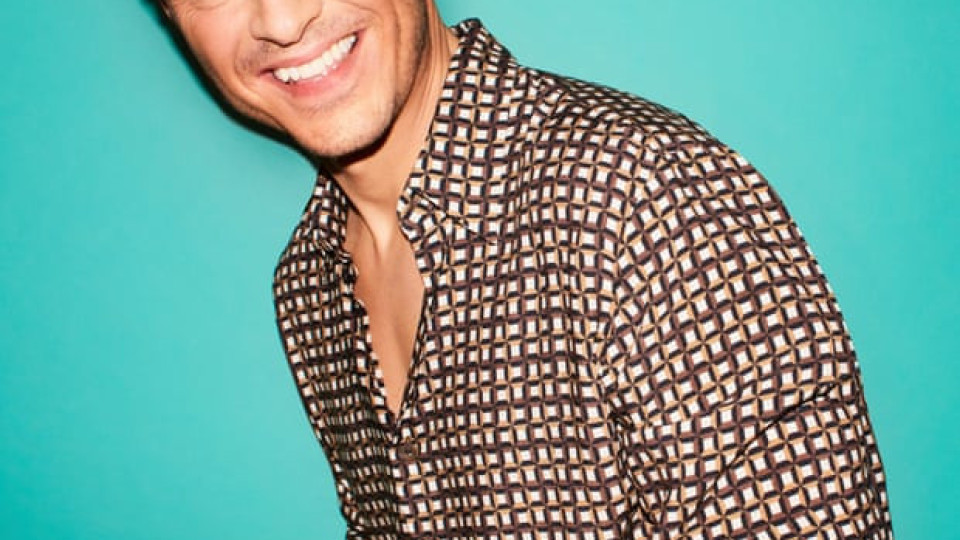

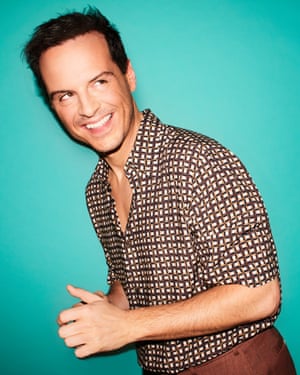




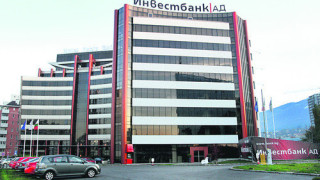


Leave a comment